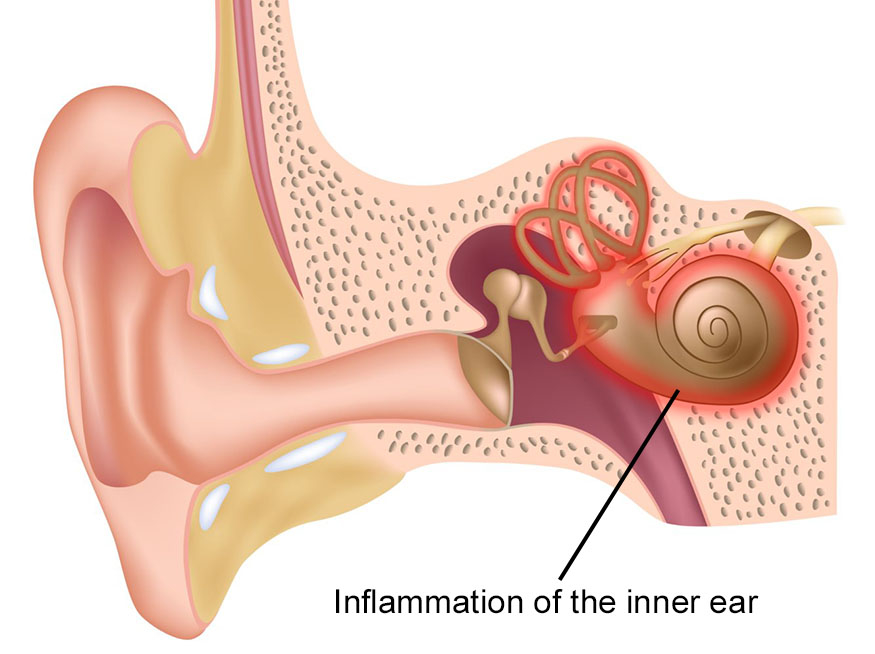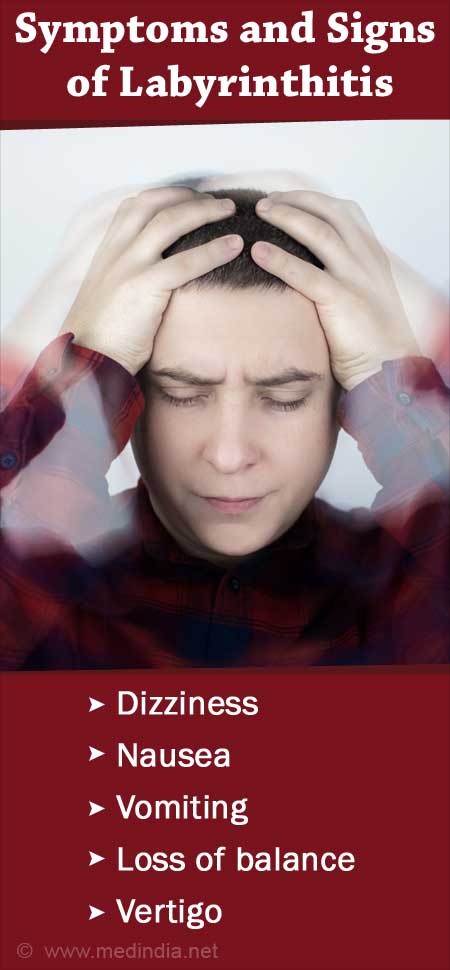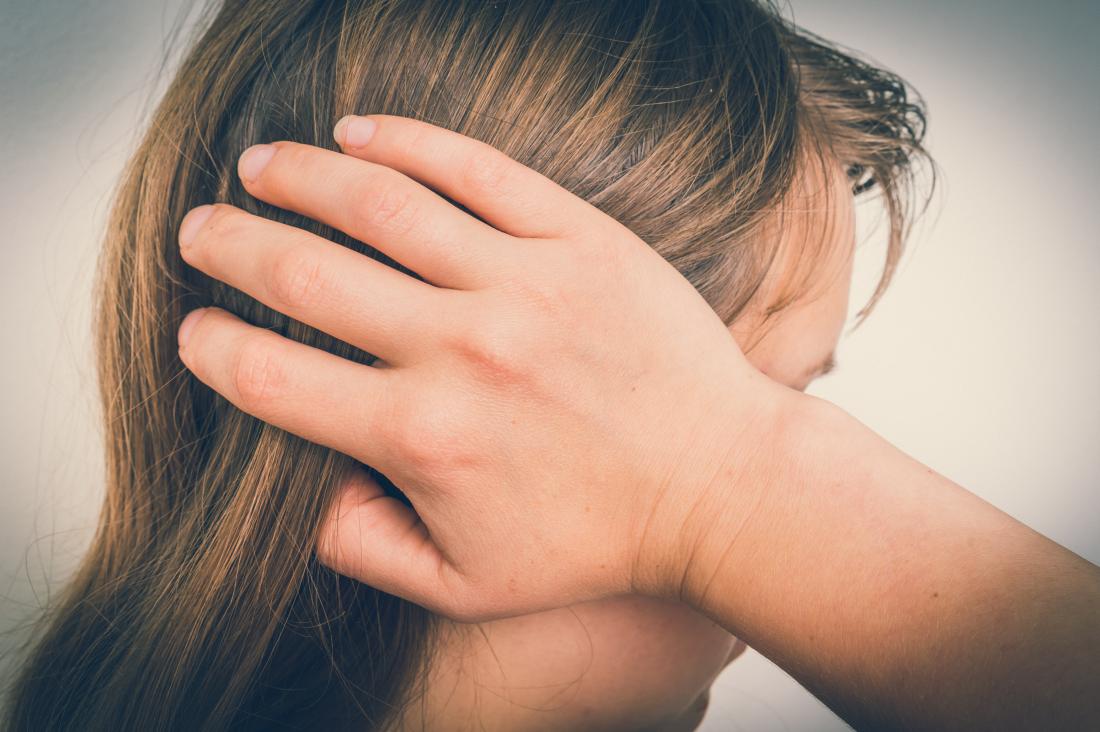Labyrinthitis symptoms-various-aspects-
Labyrinthitis, which is an inflammation of the inner ear, usually presents with abrupt vertigo, dizziness, nausea, and vomiting. Additional symptoms comprise loss of balance, hearing impairment (particularly in one ear), tinnitus (ringing in the ears), and nystagmus (involuntary eye movements).


If any patient of ENT requires any surgery, opd consultation or online consultation in clinic of ENT specialist Doctor Dr Sagar Rajkuwar ,he may contact him at the following address-
Prabha ENT clinic, plot no 345,Saigram colony, opposite Indoline furniture Ambad link road, Ambad ,1 km from Pathardi phata Nashik ,422010, Maharashtra, India-Dr Sagar Rajkuwar (MS-ENT), Cell no- 7387590194 , 9892596635
Issued in public interest by –
Labyrinthitis
Labyrinthitis refers to the inflammation of the labyrinth, which constitutes a section of your inner ear. This condition typically isn’t life-threatening, but it can result in severe symptoms such as ongoing vertigo. If not addressed, labyrinthitis may result in lasting balance problems and irreversible hearing impairment. Therefore, timely treatment is essential.


Overview
What is labyrinthitis?
Labyrinthitis (la-br-uhn-THAI-tuhs) refers to a form of inner ear infection. It occurs when your labyrinth becomes inflamed. The labyrinth is the section of your inner ear that is responsible for hearing and maintaining balance.
Labyrinthitis is closely associated with vestibular neuritis. Labyrinthitis involves the inflammation of both branches of your vestibulocochlear nerve. It impacts both hearing and balance. Vestibular neuritis, on the other hand, concerns the inflammation of one branch of your vestibulocochlear nerve. It influences only balance.
Labyrinthitis can affect anyone. However, it is most prevalent in adults between the ages of 30 and 60. Additionally, females are twice as likely to experience labyrinthitis.
Symptoms and Causes
What are the symptoms of labyrinthitis?
Individuals with labyrinthitis might notice a sudden emergence of symptoms, which may include:
- Balance problems.
- Blurred eyesight.
- Challenges with focus.
- Lightheadedness.
- Loss of hearing.
- Nausea and vomiting.
- Nystagmus (involuntary movements of the eyes).
- Tinnitus (ringing in the ears).
- Spinning sensation (vertigo).


Key Symptoms of Labyrinthitis
Vertigo: A sensation of spinning or whirling, even when one is stationary.
Dizziness: A sensation of unsteadiness or lightheadedness.
Nausea and Vomiting: Often occurs alongside the sensation of spinning or dizziness.
Loss of Balance: Trouble standing, walking, or maintaining stability.
Hearing Loss: Frequently presents in one ear and may involve high-frequency hearing loss.
Tinnitus: A buzzing, ringing, or other unusual sounds in the ear.
Nystagmus: Rapid, involuntary eye movements that can complicate focusing.
Blurred Vision: Some patients may face blurred or double vision.
Fever: In certain instances, a fever may be observed.
Ear Pain: Ear pain may also emerge as a symptom.
Labyrinthitis symptoms come and go
Yes, symptoms of Labyrinthitis can indeed fluctuate. Although they typically begin suddenly and can be quite severe for several days, they usually diminish over time. However, symptoms may return or intensify with specific head movements or activities.
Here’s a more detailed explanation:
Initial Onset:
Symptoms such as vertigo, nausea, vomiting, and balance difficulties generally appear suddenly and intensely.
Gradual Improvement:
After a few days or weeks, the symptoms typically start to lessen and may even vanish completely in many instances.
Recurrence:
Some individuals may face a recurrence of symptoms, especially when quickly moving their head or participating in particular activities that stress the inner ear.
Long-Term Issues:
In certain situations, lingering balance problems or hearing issues may continue even after the initial acute phase of labyrinthitis has concluded.
Factors that may worsen symptoms:
Head movements: Sudden or rapid head motions can instigate or exacerbate vertigo and balance problems.
Fatigue: Feeling fatigued or unwell can occasionally amplify symptoms.
Alcohol: The consumption of alcohol can aggravate dizziness and balance issues.
Other illnesses: The onset of another illness or infection may trigger or heighten labyrinthitis symptoms.
Important Note: If you are experiencing labyrinthitis symptoms, it’s essential to obtain medical attention for proper diagnosis and treatment.
labyrinthitis symptoms headache
Labyrinthitis, which is an inflammation of the inner ear, can lead to a range of symptoms, and headaches are occasionally felt. Although not the main symptom, a headache can arise in some instances, particularly if the cause of labyrinthitis is an infection. Other typical symptoms encompass vertigo, problems with balance, hearing impairment, tinnitus (a ringing sensation in the ears), nausea, and vomiting.


Here’s a more in-depth examination of labyrinthitis and headaches:
Labyrinthitis and Headaches:
Headaches as a possible symptom: Although not consistently a characteristic of labyrinthitis, headaches can arise, especially if the inflammation is connected to an infection.
Possible causes: The trigeminal nerve, which conveys sensation to the face and ears, may be stimulated by inflammation or infection in the ear, potentially leading to referred pain that presents as a headache.
Severity: Headaches linked to labyrinthitis are generally mild.
Labyrinthitis symptoms how long does it last
Labyrinthitis symptoms, such as intense vertigo, nausea, and issues with balance, generally resolve within one to three weeks. The majority of individuals achieve complete recovery within a few months. Although severe symptoms tend to diminish within a week, milder symptoms and balance difficulties may linger for several weeks. In unusual circumstances, some people may have symptoms that last for months, especially regarding balance challenges.
Detailed Breakdown:
Acute Phase:
The first episode of vertigo and other acute symptoms can be severe and may continue for several hours or days.
Resolution:
Most of the severe acute symptoms, including intense vertigo, typically diminish within a week or two.
Recovery:
While the acute phase can clear up swiftly, some residual symptoms, like dizziness during head movements or balance troubles, could last for several weeks or even months.
Full Recovery:
The majority of individuals completely recover within 2 to 3 months, but in rare instances, balance issues or minor dizziness may persist for an extended time.
Vestibular Rehabilitation:
If balance difficulties continue for months or years, vestibular rehabilitation therapy, which consists of exercises to retrain the brain and body’s balance mechanism, may be suggested.
Important Considerations:
Individual Variation:
The length of symptoms can differ among individuals, with elderly individuals possibly having prolonged dizziness.
Fluctuations in Symptoms:
It is normal for patients to encounter variations in symptoms throughout recovery, with times of enhancement followed by brief regressions.
Seeking Medical Advice:
If symptoms continue or deteriorate after a few months, it is crucial to obtain medical advice to eliminate other conditions.
What are the reasons behind labyrinthitis?
In most situations, viral infections are responsible for labyrinthitis. However, bacterial infections can also lead to it. Some of the frequently observed causes of labyrinthitis are:
- Epstein-Barr virus.
- Herpes simplex.
- Stomach flu.
- Upper respiratory infections.
In rare instances, a head injury may result in labyrinthitis.
For update on further important health related topics and frequently asked questions on health topics by general population please click on the link given below to join our WhatsApp group –
https://chat.whatsapp.com/Lv3NbcguOBS5ow6X9DpMMA
Issued in public interest by –
Risk factors
Experiencing a cold or flu may provoke labyrinthitis. The likelihood of developing labyrinthitis is also higher if you smoke or if you have:
- Alcohol use disorder.
- Allergies.
- Fatigue.
- Stress.
Some medications — including antidepressants, anti-inflammatories, and certain diabetes drugs — can also instigate labyrinthitis in certain individuals.
Complications of labyrinthitis
Labyrinthitis is generally not harmful unless left untreated. Without suitable treatment, labyrinthitis can lead to hearing impairment, a greater risk of falls, and irreversible damage to your inner ear.
Permanent hearing loss is a frequent complication in children who develop labyrinthitis as a result of meningitis. In such situations, restoring hearing may be possible through a cochlear implant.
The labyrinth, which is a key component of the inner ear and is involved in balance and hearing, is the area of the inner ear that is affected by labyrinthitis. The inflammation can result in a variety of symptoms, the most common of which are vertigo (a sensation of spinning), disorientation, nausea, and hearing loss or tinnitus. A viral infection is the most common cause, but bacterial infections or other illnesses might also be to blame.
Causes:
- Viral Infections: The most frequent cause, which includes viruses that cause measles, rubella, the flu, mumps, and the common cold.
- Bacterial Infections: Less common, but can result from meningitis or middle ear infections.
- Other Causes: Certain drugs, allergies, and autoimmune disorders may all contribute to labyrinthitis.
Symptoms:
- Vertigo: The feeling that the world is rotating around you or that you are spinning.
- Dizziness: A broad sense of unsteadiness or lightheadedness.
- Vomiting and nausea: frequently go hand in hand with vertigo and dizziness.
- Hearing Loss: Can impact either one or both ears.
- Tinnitus: Ringing or buzzing in the ears.
- Balance Issues: Challenges with coordination and balance.
- Movements of the Eyes: It’s possible to have uncontrollable, jerky eye movements (nystagmus).
Diagnosis and Therapy:
Diagnosis:
A physician will review your symptoms, do a physical examination, and may do tests to determine your hearing and balance.
Therapy:
- Management of Symptoms: Some medications, such as antihistamines or antiemetics, can help with vertigo, nausea, and dizziness.
- Treatment of Infection: Antibiotics may be prescribed if the cause is a bacterial illness.
- Physical Therapy: Vestibular rehabilitation therapy can assist patients in regaining balance and coordination.
- Steroids: Can be used to lessen inflammation.
Key factors to consider:
- Severity: The symptoms of labyrinthitis might be mild or severe.
- Symptoms typically get better after a few weeks, but some individuals may still have balance or hearing problems.
- Seek Medical Advice: It is essential to visit a doctor for an accurate diagnosis and treatment if you have any of the symptoms of labyrinthitis.
What does labyrinthitis mean?
The labyrinth, a section of the inner ear, is where labyrinthitis, or inflammation, occurs. Inflammation of the vestibulocochlear nerve, also known as the eighth cranial nerve, is another possibility. The inflammation of these results in symptoms like nausea, vomiting, tinnitus (ringing in the ear), hearing loss, impaired hearing, and a feeling of spinning (vertigo). These symptoms usually disappear on their own in the majority of individuals. This illness is not common. It frequently only affects one ear.
The labyrinth is a network of fluid-filled tubes and chambers located inside the inner ear. The cochlea collects data about sound within the inner ear. Data about motion and spatial changes is collected by the vestibular organs. All of these contribute to a feeling of equilibrium. All of this data is transmitted from the inner ear to the brain via the eighth cranial nerve.
A nerve or the labyrinth can become inflamed and irritated when it is infected. As a result, it may not function properly. It could result in hearing loss in one ear. The brain must now figure out the discrepancies between the data from the healthy nerve and the damaged one. Vertigo results from this.
What are the causes of labyrinthitis?
The ailment can be brought on by a viral illness of the eighth cranial nerve or the labyrinth. The virus might have spread throughout your entire body. It could also have an impact on just the eighth cranial nerve and labyrinth. Usually, just one nerve is impacted. Some of the viruses known to produce labyrinthitis include:
- The family of viruses known as herpes
- Flu
- Measles
- Mumps
- Rubella
- Polio
- Hepatitis
- Epstein-Barr
- Varicella
Children often experience bacterial infections in the middle ear. A middle ear infection might, in rare instances, spread to the inner ear and result in labyrinthitis. Middle-ear infections that are persistent (chronic) and untreated are more dangerous in this regard. Rarely, labyrinthitis can be brought on by bacterial meningitis, a head trauma, or particular autoimmune diseases. The reason is unknown in other cases.
What individuals are at risk for developing labyrinthitis?
Your risk increases if you have a viral infection that might lead to labyrinthitis. If your kid hasn’t gotten the recommended vaccinations or if they have persistent, neglected middle ear infections, their risk may be higher.
The signs of labyrinthitis are
Symptoms of labyrinthitis can include:
- Vertigo is a sense of disorientation or dizziness.
- Dizziness
- Walking without balance
- vomiting and nausea
- Being unable to concentrate
- Nystagmus are times when the eyes move uncontrollably in opposite directions.
- Hearing loss
- ringing in the ears (tinnitus)
You can experience anything from minor to significant symptoms. They may start off very quickly. These symptoms usually disappear in most individuals within a few weeks. Others experience symptoms that persist for a longer period of time.
Vestibular neuritis is a linked condition that has similar symptoms. However, it does not result in hearing loss. The vestibular portion of the labyrinth and the eighth cranial nerve are the only tissues impacted by the inflammation.
Neurological symptoms of labyrinthitis include intense headache, speech difficulties, and loss of movement in the arms or legs.
For important health related topics please click on our facebook page link given below or copy paste this link into google search –
https://www.facebook.com/positivemind.healthcare
For important health related videos please click on the link of our youtube channel given below or copy paste this link into google search-
http://www.youtube.com/@healthuseful8539/
Click on the link below to learn more about this disease.
Issued in public interest by –




